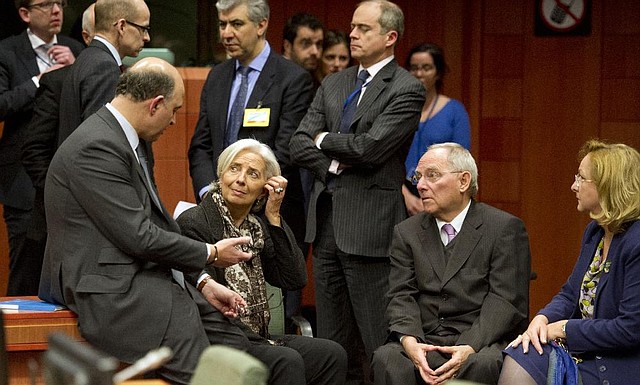EU officials OK bailout for Cyprus
French Finance Minister Pierre Moscovici (from front left), Managing Director of the International Monetary Fund Christine Lagarde, German Finance Minister Wolfgang Schaeuble and Austria’s Finance Minister Maria Fekter talk during an emergency eurogroup meeting in Brussels on Sunday.
Monday, March 25, 2013
BRUSSELS - Cyprus secured a package of rescue loans in tense, last-ditch negotiations early today, EU diplomats said, saving the country from a banking system collapse and bankruptcy.
The cash-strapped island nation needs a $13 billion bailout to recapitalize its ailing banks and keep the government afloat. The European Central Bank had threatened to cut crucial emergency assistance to the country’s banks by Tuesday without an agreement.
The finance ministers of the 17-nation eurozone accepted the plan reached in 10 hours of negotiations, the diplomats said. They spoke on condition of anonymity pending the official announcement.
The head of the finance ministers, Jeroen Dijsselbloem of the Netherlands, said the agreement could “be implemented without delay” without a new vote by the Cypriot Parliament, which had rejected a deal last week, because legislators had already passed legislation Friday that set the framework for the new action. “This has indeed been an arduous week for Cyprus,” he said.
Under the plan, Cyprus’ second-largest bank, Laiki, will be restructured and holders of bank deposits of more than $130,000 will have to take losses. It was not immediately clear whether the holders of large deposits in the remaining Cypriot banks would also be forced to take losses.
Without a deal by tonight, the tiny Mediterranean island nation of about 1 million would face the prospect of bankruptcy, which could force it to abandon the euro currency and spur turmoil in the eurozone of 300 million people.
The Bank of Cyprus, the nation’s largest lender, would take over the viable assets of Laiki, along with $11.7 billion in central bank-provided emergency liquidity aid, according to three EU officials who asked not to be named because talks are ongoing.
As euro finance ministers milled around, Cypriot President Nicos Anastasiades struck the bargain with officials including European Union President Herman Van Rompuy, European Central Bank President Mario Draghi and International Monetary Fund Managing Director Christine Lagarde.
The day was filled with confusion and rancor. Reports filtered out of heated confrontations between Anastasiades and EU negotiators, and especially with the International Monetary Fund, which Anastasiades has accused of trying to push Cyprus up against a wall.
Making large deposit holders take a hit is expected to net several billion dollars, thus reducing the amount of rescue loans the country needs.
The euro rose on news of the provisional agreement that would make Cyprus the fifth country to tap a rescue since the euro debt crisis broke out in Greece in 2009. The European currency rose 0.4 percent to $1.3035 early today.
Last summer, Cyprus’ banks took steep losses on their large holdings of Greek bonds when that nation was given its own bailout and bondholders had to take losses. Coupled with a decline in real estate values, the banking troubles forced Cypriot leaders to formally ask for a bailout.
To secure a rescue loan package, Nicosia had to find ways to raise $7.5 billion so it could qualify for the $13 billion bailout package. The bulk of that money is now being raised by forcing losses on large deposit holders as well as bond holders in Laiki bank, which will be split into a bad bank of toxic assets and a remaining viable core business.
But Cyprus resisted pressure by creditors to also unwind the country’s largest lender, Bank of Cyprus, the diplomat said.
In Cyprus, Parliament President Yiannakis Omirou confirmed that a preliminary agreement had been reached after about 10 hours of negotiations in Brussels. He couldn’t provide details but stressed the agreement “doesn’t involve the resolution of the Bank of Cyprus.”
The European Central Bank had threatened to stop providing emergency funding to Cyprus’ banks as of Tuesday if there were no agreement on how to raise the $7.5 billion.
A plan agreed to in marathon negotiations earlier this month called for a one-time levy on all bank depositors in Cypriot banks. But the proposal ignited fierce anger among Cypriots because it also targeted small savers. It failed to win a single vote in the Cypriot Parliament.
Cyprus needs significantly more than the $13 billion bailout, but the international creditors fear that more loans would raise the country’s debt to an unsustainable level. For that reason, Cyprus has been told it must raise the additional money by itself.
Under the new agreement, average savers’ deposits with all Cypriot banks of up to $130,000 will be guaranteed by the state in accordance with the EU’s deposit insurance guarantee, a diplomat said.
A loss of no more than 40 percent will be imposed on uninsured depositors at the Bank of Cyprus, two EU officials said. Uninsured depositors at Laiki would largely be wiped out, two other officials said.
In an illustration of the depth of the fear of a banking collapse, Cyprus’ central bank on Sunday imposed a daily withdrawal limit of $130 from ATMs of the country’s two largest banks to prevent a bank run by depositors worried about their savings.
Cypriot banks have been closed this past week while officials worked on a rescue plan, and they are not due to reopen until Tuesday. Cash has been available through ATMs, but long lines formed and many machines have quickly run out of cash.
Cash has become king here. Retailers, gas stations and supermarkets, gripped by uncertainty over whether Cyprus will really secure a 10 billion euro financial lifeline to keep the banking system from collapse, are increasingly refusing to take credit cards and checks.
”It’s been cash only here for three days,” said Ali Wissom, the manager at Il Forno di Jenny’s restaurant off the main square in Nicosia. “The banks have closed, we don’t really know if they will reopen, and all of our suppliers are demanding cash - even the beer company.”
At the Centrum Hotel, Georgia Xenophontes, 23, an employee in the front office, said she drained her bank account at a cash machine last week - just in time to avoid being hit with the latest withdrawal limit.
“This is affecting everything in our lives,” she said. “Even though you don’t want to count on money, you need it. But we don’t have stability.”
About 50 people protested outside the European Council building in Brussels where the finance ministers were meeting. They waved a Cypriot flag and a sign saying: “Enough is enough. Cyprus is not a second-class EU state.”
The international creditors, led by the IMF, were seeking a fundamental restructuring of the out-sized financial system, which is worth up to eight times the country’s gross domestic product of about $23.3 billion. They say the country’s business model of attracting foreign investors, among them many Russians, with low taxes and lax financial regulation has backfired and must be upended.
They also insisted that Cyprus couldn’t receive more loans because that would make its debt burden unsustainably high.
Once the eurozone’s finance ministers sign off on a bailout deal, the European Central Bank is expected to continue providing liquidity to the Cypriot banks, avoiding an imminent collapse. Several national parliaments in eurozone countries such as Germany then must also approve the bailout deal, which might take another few weeks.
While Anastasiades, who took office less than a month ago, has faced mounting criticism from many Cypriots for his handling of the crisis, he was cheered like a soccer star before a big game by a dwindling band of die-hard fans Sunday.
Information for this article was contributed by Don Melvin, Juergen Baetz, Elena Becatoros and Menelaos Hadjicostis of The Associated Press; by Rebecca Christie, James G. Neuger, Tom Stoukas, Ana Bandea, Stephanie Bodoni, Corina Ruhe, Jim Brunsden, Mark Deen, Stefan Riecher, Svenja O’Donnell, Tom Stoukas, Georgios Georgiou, Marcus Bensasson, Paul Tugwell, Natalie Weeks and Maria Petrakis of Bloomberg News; and by Andrew Higgins James,James Kanter and Liz Alderman of The New York Times.
Front Section, Pages 1 on 03/25/2013

